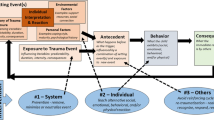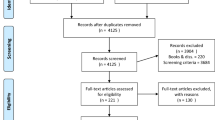Abstract
Childhood trauma can adversely impact academic performance, classroom behaviour, and student relationships. Research has gradually explored integrated approaches to care for traumatised students in schools. Increasingly, research has pointed to implementation of multi-tiered programs to trauma-informed care for traumatised students in schools. However, evaluations of these programs are limited and no systematic review of the existing evidence has been conducted. The aim of this research was to be the first systematic review to explore evidence on multi-tiered, trauma-informed approaches to address trauma in schools. Results of this systematic review yielded 13 published and unpublished studies. Findings indicated that further research, guided by empirical evidence of the effectiveness of multi-tiered and trauma-sensitive approaches in schools, is required. Recommendations for research in the area of trauma-sensitive, multi-tiered care in schools are provided.


Similar content being viewed by others
References
References marked with an asterisks indicate studies included in the systematic review
Alisic, E. (2012). Teachers’ perspectives on providing support to children after trauma: A qualitative study. School Psychology Quarterly,27(1), 51–59. https://doi.org/10.1037/a0028590.
Alisic, E., Bus, M., Dulack, W., Pennings, L., & Splinter, J. (2012). Teachers’ experiences supporting children after traumatic exposure. Journal of Traumatic Stress,25, 98–101. https://doi.org/10.1002/jts.20709.
Berger, E., Carroll, M., Mayberry, D., & Harrison, D. (2018). Disaster impacts on students and staff from a specialist, trauma-informed Australian school. Journal of Child and Adolescent Trauma,11(4), 521–530. https://doi.org/10.1007/s40653-018-0228-6.
Berger, R., Abu-Raiya, H., & Benatov, J. (2016). Reducing primary and secondary traumatic stress symptoms among educators by training them to deliver a resiliency program (ERASE-Stress) following the Christchurch earthquake in New Zealand. The American Journal of Orthopsychiatry,86(2), 236–251. https://doi.org/10.1037/ort0000153.
Berger, R., & Gelkopf, M. (2009). School-based intervention for the treatment of tsunami-related distress in children: A quasi-randomised controlled trial. Psychotherapy and Psychosomatics,78, 364–371. https://doi.org/10.1159/000235976.
Bride, B. E. (2007). Prevalence of secondary traumatic stress among social workers. Social Work,52(1), 63–70. https://doi.org/10.1093/sw/52.1.63.
Chafouleas, S. M., Johnson, A. H., Overstreet, S., & Santos, N. M. (2016). Towards a blueprint for trauma-informed service delivery in schools. School Mental Health,8, 144–162. https://doi.org/10.1007/s12310-015-9166-8.
Chafouleas, S. M., Koriakin, T. A., Roundfield, K. D., & Overstreet, S. (2019). Addressing childhood trauma in school settings: A framework for evidence-based practice. School Mental Health,11, 40–53. https://doi.org/10.1007/s12310-018-9256-5.
*Cicchetti, C. (2017). A school-community collaboration model to promote access to trauma-informed behavioural health supports. Journal of the American Academy of Child and Adolescent Psychiatry,56(10S), S30. https://doi.org/10.1016/j.jaac.2017.07.118.
Cohen, J. A., Jaycox, L. H., Walker, D. W., Mannarino, A. P., Langley, A. K., & DuClos, J. L. (2009). Treating traumatised children after hurricane Katrina: Project Fleur-de Lis™. Clinical Child and Family Psychology Review,12(1), 55–64. https://doi.org/10.1007/s10567-009-0039-2.
Day, A. G., Somers, C. L., Baroni, B. A., West, S. D., Sanders, L., & Peterson, C. D. (2015). Evaluation of a trauma-informed school intervention with girls in a residential facility school: Student perceptions of school environment. Journal of Aggression, Maltreatment & Trauma,24(10), 1086–1105. https://doi.org/10.1080/10926771.2015.1079279.
*Dorado, J. S., Martinez, M., McArthur, L. E., & Leibovitz, T. (2016). Healthy Environments in Response to Trauma in Schools (HEARTS): A whole-school, multi-level, prevention and intervention program for creating trauma-informed, safe and supportive schools. School Mental Health,8(1), 163–176. https://doi.org/10.1007/s12310-016-9177-0.
Dyregrov, K. (2009). The important role of the school following suicide in Norway. What support do young people think that school could provide? Omega (Westerport),59(2), 147–161. https://doi.org/10.2190/OM.59.2.d.
Dyregrov, A., Bie Wikander, A. M., & Vigerust, S. (1999). Sudden death of a classmate and friend: Adolescents’ perception of support from their school. School Psychology International,20(20), 191–208. https://doi.org/10.1177/0143034399202003.
*Ellis, B. H., Miller, A. B., Abdi, S., Barrett, C., Blood, E. A., & Betancourt, T. S. (2013). Multi-tier mental health program for refugee youth. Journal of Consulting and Clinical Psychology,81(1), 129–140. https://doi.org/10.1037/a0029844.
Fu, C., & Underwood, C. (2015). A meta-review of school-based disaster interventions for child and adolescent survivors. Journal of Child and Adolescent Mental Health,27(3), 161–171. https://doi.org/10.2989/17280583.2015.1117978.
*Garfin, D. R., Silver, R. C., Gil-Rivas, V., Guzmán, J., Murphy, J. M., Cova, F., et al. (2014). Children’s reactions to the 2010 Chilean Earthquake: The role of trauma exposure, family context, and school-based mental health programming. Psychological Trauma: Theory, Research, Practice, and Policy,6(5), 563–573. https://doi.org/10.1037/a0036584.
Gonzalez, A., Monzon, N., Solis, D., Jaycox, L., & Langley, A. K. (2015). Trauma exposure in elementary school children: Description of screening procedures, level of exposure, and posttraumatic stress symptoms. School Mental Health,8(1), 77–88. https://doi.org/10.1007/s12310-015-9167-7.
*Hansel, T. C., Osofsky, H., Osofsky, J. D., Costa, R. N., Kronenberg, M. E., & Selby, M. L. (2010). Attention to process and clinical outcomes of implementing a rural trauma treatment program. Journal of Traumatic Stress,23(6), 708–715. https://doi.org/10.1002/jts.20595.
*Holmes, C., Levy, M., Smith, A., Pinne, S., & Neese, P. (2015). A model for creating a supportive trauma-informed culture for children in preschool settings. Journal of Child and Family Studies,24(6), 1650–1659. https://doi.org/10.1007/s10826-014-9968-6.
*Hurley, J. J., Saini, S., Warren, R. A., & Carberry, A. J. (2013). Use of the pyramid model for supporting preschool refugees. Early Child Development and Care,183(1), 75–91. https://doi.org/10.1080/03004430.2012.655242.
Individuals with Disabilities Education Improvement Act of 2004 (IDEA). (2004). Public law 108-446, 118, Stat. 2647.
Jaycox, L. H., Langley, A. K., Stein, B. D., Wong, M., Sharma, P., Scott, M., et al. (2009). Support for students exposed to trauma: A pilot study. School Mental Health,1(2), 49–60. https://doi.org/10.1007/s12310-009-9007-8.
Kenny, M. C. (2001). Child abuse reporting: Teachers’ perceived deterrents. Child Abuse and Neglect,25, 81–92.
Kenny, M. C. (2004). Teachers’ attitudes toward and knowledge of child maltreatment. Child Abuse and Neglect,28, 1311–1319.
*Layne, C. M., Saltzman, W. R., Poppleton, L., Burlingame, G. M., Pasalić, A., Duraković, E., et al. (2008). Effectiveness of a school-based group psychotherapy program for war-exposed adolescents: A randomised controlled trial. Journal of the American Academy of Child and Adolescent Psychiatry,47(9), 1048–1062. https://doi.org/10.1097/CHI.0b013e31817eecae.
*McConnico, N., Boynton-Jarrett, R., Bailey, C., & Nandi, M. (2016). A framework for trauma-sensitive schools: Infusing trauma-informed practices into early childhood education systems. Zero to Three,36(5), 36–44.
McDermott, B. M., & Cobham, V. E. (2014). A stepped-care model of post-disaster child and adolescent mental health service provision. European Journal of Psychotraumatology. https://doi.org/10.3402/3jpt.v5.24294.
Mendelson, T., Tandon, S. D., O’Brennan, L., Leaf, P. J., & Ialongo, N. S. (2015). Brief report: Moving prevention into schools: The impact of a trauma-informed school-based intervention. Journal of Adolescence,43, 142–147. https://doi.org/10.1016/j.adolescence.2015.05.017.
Mrazek, P. J., & Haggerty, R. J. (1994). Reducing risks for mental disorders: Frontiers for preventive intervention research. Washington, DC: National Academy Press.
Nadeem, E., & Ringle, V. A. (2016). De-adoption of an evidence-based trauma intervention in schools: A retrospective report from an urban school district. School Mental Health,8, 132–143. https://doi.org/10.1007/s12310-016-9179-y.
Papadatou, D., Metallinou, O., Hatzichristou, C., & Pavlidi, L. (2002). Supporting the bereaved child: Teacher’s perceptions and experiences in Greece. Mortality,7(3), 324–339. https://doi.org/10.1080/1357627021000025478.
Perfect, M. M., Turley, M. R., Carlson, J. S., Yohanna, J., & Saint Gilles, M. P. (2016). School-related outcomes of traumatic event exposure and traumatic stress symptoms in students: A systematic review of research from 1990 to 2015. School Mental Health,8, 7–43. https://doi.org/10.1007/s12310-016-9175-2.
*Perry, D., & Daniels, M. (2016). Implementing trauma-informed practices in the school setting: A pilot study. School Mental Health,8(1), 177–188. https://doi.org/10.1007/s12310-016-9182-3.
Phifer, L. W., & Hull, R. (2016). Helping students heal: Observations of trauma-informed practices in the schools. School Mental Health,8, 201–205. https://doi.org/10.1007/s12310-016-9183-2.
Plumb, J. L., Bush, K. A., & Kersevich, S. E. (2016). Trauma-sensitive schools: An evidence-based approach. School Social Work Journal,40(2), 37–60.
Powell, T. M., & Bui, T. (2016). Supporting social and emotional skills after a disaster: Findings from a mixed method study. School Mental Health,8, 106–119. https://doi.org/10.1007/s12310-016-9180-5.
Price, O. A., Ellis, H. B., Escudero, P. V., Huffman-Gottschling, K., Sander, M. A., & Birman, D. (2012). Implementing trauma interventions in schools: Addressing the immigrant and refugee experience. Advances in Education in Diverse Communities: Research, Policy and Praxis,9, 95–119.
Reinbergs, E. J., & Fefer, S. A. (2018). Addressing trauma in schools: Multitiered service delivery options for practitioners. Psychology in the Schools,55(3), 250–263. https://doi.org/10.1002/pits.22105.
Rolfsnes, E. S., & Idsoe, T. (2011). School-based intervention programs for PTSD symptoms: A review and meta-analysis. Journal of Traumatic Stress,24(2), 155–165. https://doi.org/10.1002/jts.20622.
Runge, T. J., Knoster, T. P., Moerer, D., Breinich, T., & Palmiero, J. (2017). A practical protocol for situating evidence-based mental health programs and practices within school-wide positive behavioural interventions and supports. Advances in School Mental Health Promotion,10(2), 101–112. https://doi.org/10.1080/1754730X.2017.1285708.
*Saint Gilles, M. P. (2016). A pilot study of the effects of a trauma supplement intervention on agency attitudes, classroom climate, head start teacher practices and student trauma-related symptomology. Doctor of Philosophy thesis, Michigan, USA: Michigan State University.
Saltzman, W. R., Layne, C. M., Steinberg, A. M., Arslanagic, B., & Pynoos, R. S. (2003). Developing a culturally and ecologically sound intervention program for youth exposed to war and terrorism. Child and Adolescent Psychiatric Clinics of North America,12, 319–342. https://doi.org/10.1016/S1056-4993(02)00099-8.
*Shamblin, S., Graham, D., & Bianco, J. A. (2016). Creating trauma-informed schools for rural Appalachia: The partnerships program for enhancing resiliency, confidence and workforce development in early childhood education. School Mental Health,8(1), 189–200. https://doi.org/10.1007/s12310-016-9181-4.
Simonsen, B., MacSuga-Gage, A. S., Briere, D. E., Freeman, J., Myers, D., Scott, T. M., et al. (2014). Multitiered support framework for teachers’ classroom-management practices: Overview and case study of building the triangle for teachers. Journal of Positive Behaviour Interventions,16(3), 179–190.
Smith Hatcher, S., Bride, B. E., Oh, H., Moultrie King, D., & Catrett, J. F. (2011). An assessment of secondary traumatic stress in juvenile justice education workers. Journal of Correctional Health Care,17(3), 208–217. https://doi.org/10.1177/1078345811401509.
*Stokes, H., & Turnbull, M. (2016). Evaluation of the Berry Street Education Model: Trauma informed positive education enacted in mainstream schools. Melbourne, Victoria: University of Melbourne Graduate School of Education, Youth Research Centre.
Sugai, G., & Horner, R. R. (2006). A promising approach for expanding and sustaining school-wide positive behaviour support. School Psychology Review,35(2), 245–259.
Weems, C. F., Scott, B. G., Taylor, L. K., Cannon, M. F., Romano, D. M., & Perry, A. M. (2013). A theoretical model for continuity in anxiety and links to academic achievement in disaster-exposed school children. Development and Psychopathology,25(3), 729–737. https://doi.org/10.1017/S0954579413000138.
Weist, M. D., Eber, L., Horner, R., Speltt, J., Putman, R., Barrett, S., et al. (2018). Improving multitiered systems of support for students with “Internalising” emotional/behavioural problems. Journal of Positive Behavior Interventions, 20(3), 172–184.
Wolmer, L., Hamiel, D., Barchas, J. D., Slone, M., & Laor, N. (2011a). Teacher-delivered resilience-focused intervention in schools with traumatised children following the second Lebanon War. Journal of Traumatic Stress,24(3), 309–316. https://doi.org/10.1002/jts.20638.
Wolmer, L., Hamiel, D., & Laor, N. (2011b). Preventing children’s posttraumatic stress after disaster with teacher-based intervention: A controlled study. Journal of the American Academy of Child and Adolescent Psychiatry,50(4), 340–348. https://doi.org/10.1016/j.jaac.2011.01.002.
Woodbridge, M. W., Sumi, W. C., Thornton, S. P., Fabikant, N., Rouspil, K. M., Langley, A. K., et al. (2015). Screening for trauma in early adolescence: Findings from a diverse school district. School Mental Health,8(1), 89–105. https://doi.org/10.1007/s12310-015-9169-5.
Zakszeski, B. N., Ventresco, N. E., & Jaffe, A. R. (2017). Promoting resilience through trauma-focused practices: A critical review of school-based implementation. School Mental Health,9(4), 310–321. https://doi.org/10.1007/s12310-017-9228-1.
Author information
Authors and Affiliations
Corresponding author
Ethics declarations
Conflict of interest
The author declares that she has no conflict of interest.
Ethical Approval
This article does not contain any studies with human participants or animals performed by the author.
Additional information
Publisher's Note
Springer Nature remains neutral with regard to jurisdictional claims in published maps and institutional affiliations.
Rights and permissions
About this article
Cite this article
Berger, E. Multi-tiered Approaches to Trauma-Informed Care in Schools: A Systematic Review. School Mental Health 11, 650–664 (2019). https://doi.org/10.1007/s12310-019-09326-0
Published:
Issue Date:
DOI: https://doi.org/10.1007/s12310-019-09326-0




